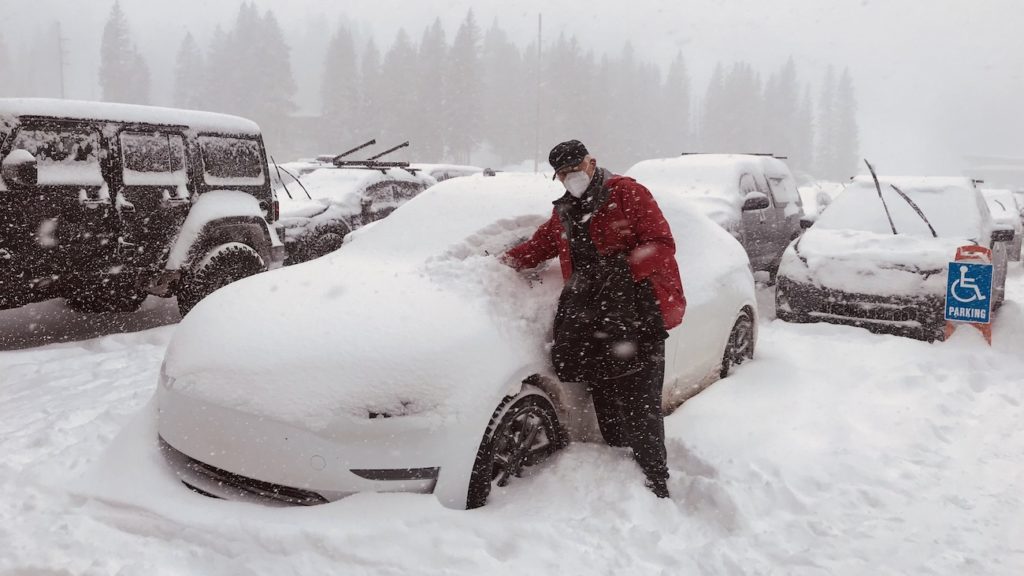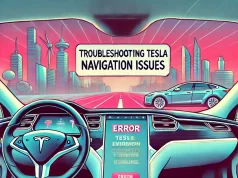Some Tesla owners have reported getting stuck in snow or running out of battery during winter road trips.
How can you prevent this from happening to you?
And what should you do if you find yourself in such a situation? Here are some tips and advice on how to handle Tesla stuck in snow.
How to Deal with Tesla Stuck in Snow?

If you do get stuck in snow despite taking these precautions, don’t panic. There are some things you can do to try to get out of the rut:
#1. Turn off the traction control
Traction control is a feature that prevents your wheels from spinning excessively by applying brakes or reducing power.
While this can be useful in normal conditions, it can also prevent you from gaining momentum and digging yourself out of deep snow.
To turn off traction control, go to Controls > Driving > Traction Control > Off.
#2. Rock your car back and forth
Another technique is to rock your car back and forth by shifting between forward and reverse gears while applying gentle gas.
This can help you create some space and momentum to break free from the snow.
However, be careful not to overheat your motor or damage your transmission by doing this too much.
#3. Use the snow mode
Some Tesla models have a snow mode option that can be activated from the touchscreen.
This mode adjusts the power delivery, traction control, and stability control to optimize the performance and handling of the car in snowy conditions.
Snow mode can help you maintain control and avoid getting stuck in snow.
#4. Use the heated seats and steering wheel
If you are stuck in the snow and waiting for help, you can use the heated seats and steering wheel to keep yourself warm and comfortable.
You can also turn on the climate control to defrost the windows and prevent ice buildup.
However, be aware that using these features will consume battery power, so use them sparingly and monitor your battery level.
#5. Use the Sentry Mode
If you have to leave your car in a snowy area, you can activate the Sentry Mode to protect your car from theft or vandalism.
Sentry Mode uses cameras and sensors to monitor the surroundings and alert you if it detects any threats.
It also records any incidents and saves them to a USB drive. Sentry Mode can help you keep your car safe and secure in winter.
#6. Use a shovel or a mat
If you have a shovel or a mat in your trunk, you can use them to clear some snow around your tires or create some friction under them.
You can also use branches, rocks, sand, or salt if you have any nearby. Be careful not to damage your car or injure yourself while doing this.
#7. Use winter tires
Winter tires are specially designed to provide better grip and traction on snowy and icy roads.
They also improve braking and handling. Tesla recommends using winter tires for temperatures below 45°F (7°C).
#8. Use slip start mode
Slip start mode is a feature that allows the driver to temporarily disable some of the traction control functions to help the vehicle get out of slippery situations.
To activate slip start mode, go to Controls > Service > Slip Start on the touchscreen.
#9. Use off-road assist mode
Off-road assist mode is a feature that optimizes the vehicle’s performance for off-road driving conditions, such as snow, mud, sand, or gravel.
It adjusts the suspension height, traction control, stability control, and regenerative braking.
To activate off-road assist mode, go to Controls > Off-Road Assist on the touchscreen.
#10. Carry a portable charger
A portable charger can be a lifesaver if the vehicle runs out of battery in a remote area or during a traffic jam.
A portable charger can plug into a standard 120V or 240V outlet and provide some extra juice to the vehicle.
However, it may take longer to charge than a Supercharger or a wall connector.
#11. Carry some emergency supplies
It is always a good idea to carry some emergency supplies when driving in winter conditions, such as blankets, water, food, flashlights, shovels, sand or kitty litter, jumper cables, tire chains, etc.
These items can help the driver stay warm, hydrated, fed, visible, and unstuck in case of an emergency.
How to Prevent Tesla Stuck in Snow?
The best way to avoid getting stuck in snow is to prepare your Tesla before hitting the road.
Here are some things you can do to ensure a smooth and safe ride:
#1. Check the weather forecast
Before you plan your trip, make sure you are aware of the weather conditions along your route.
Avoid driving in areas that are prone to heavy snowfall, blizzards, or ice storms.
If possible, postpone your trip until the weather clears up or choose an alternative route that is less affected by snow.
#2. Charge your battery fully
Cold weather can reduce your Tesla’s battery range by about 20%.
This means that you will need more energy to drive the same distance as in normal conditions.
To avoid running out of juice, make sure you charge your battery to 100% before you leave.
You can also use the Tesla app or the navigation system to locate the nearest Supercharger stations along your way and plan your stops accordingly.
#3. Install winter tires
Winter tires are specially designed to provide better traction and handling on snowy and icy roads.
They have deeper treads, softer rubber compounds, and studs or sipes that grip the surface better than regular tires.
Winter tires can improve your Tesla’s performance and safety in winter driving by reducing braking distance, preventing skidding, and increasing stability.
You can order winter tires from Tesla or buy them from other reputable sources.
#4. Adjust your driving settings
Your Tesla has several features that can help you adapt to different driving conditions.
For example, you can activate the Slip Start mode, which allows more wheel spin and torque to help you get out of slippery situations.
You can also lower your suspension height, reduce your speed, increase your following distance, and use regenerative braking sparingly to improve your traction and efficiency.
Conclusion
Tesla stuck in snow can be a frustrating and dangerous situation, but it can be avoided and dealt with if you follow some simple steps.
By preparing your car, checking the weather, charging your battery, installing winter tires, adjusting your driving settings, turning off traction control, using a shovel or a mat, rocking your car back and forth, or calling for help, you can ensure a smooth and safe winter driving experience with your Tesla.




